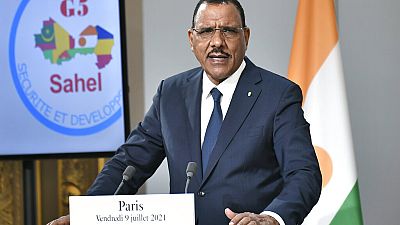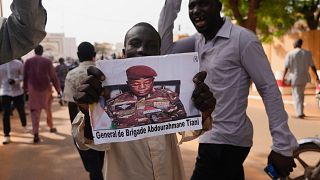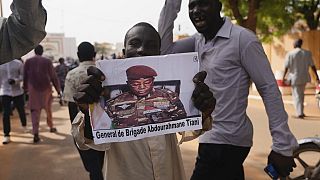Niger
Niger's President Mohamed Bazoum, overthrown in a coup on July 26, enters his 80th day in detention with his wife and son on Friday. He still refuses to resign and hopes to win his case in court.
While many countries and organizations continue to call for his release, the ruling military regime remains adamant for the time being.
- Nearly three months in detention -
Since the coup on July 26, Mohamed Bazoum has been held prisoner in his residence in the presidential palace, along with his wife Haziza and son Salem.
"His situation has not changed," says his Senegalese lawyer Mohamed Seydou Diagne.
According to members of his entourage interviewed by AFP, he is still "sequestered without electricity", and with intermittent access to water.
"He receives fresh food supplies every other day and regular visits from his doctor," says one of these sources, who adds that he is doing well, as are his wife and son.
"He's as strong as ever. He's not going to resign," insists another source close to him.
In early August, Mohamed Bazoum described himself as a "hostage" in an article for the Washington Post, and described his family's treatment as "inhuman and cruel" to the NGO Human Rights Watch.
- Referral to the courts -
On September 18, Mohamed Bazoum decided to refer his case to the West African courts to demand his release and the restoration of constitutional order in Niger.
"When you file a petition, the opposing party has one month to respond. At the end of this period, the Ecowas Court of Justice sets a date for the hearing," explained Me Diagne to AFP.
"There is a main petition accompanied by an accelerated petition so that the Court can schedule a hearing within a few weeks", he continued.
A group of lawyers mandated by one of Mohamed Bazoum's daughters had announced in early October their intention to lodge a complaint against the military regime in Niamey, but this has still not been filed, according to one of the lawyers.
- International support -
The coup d'état was swiftly condemned by Niger's Western partners, such as France and the United States, and by the UN, which expressed its support for Mohamed Bazoum and demanded his release.
A few days later, ECOWAS adopted the same position and threatened Niger with armed intervention.
Although this option is officially still on the table, it has not yet been implemented.
France, one of Mohamed Bazoum's most fervent supporters, began withdrawing its 1,400 or so soldiers from the anti-jihadist campaign on October 9, and sent its ambassador to Niamey, Sylvain Itté, back to Paris at the end of September, two demands made by the regime.
"The issue remains the release of Bazoum and the restoration of civilian power in Niger. And so the need also remains for coordinated pressure with partners in the region on the de facto authorities", asserts a French diplomatic source.
On the US side, Secretary of State Antony Blinken spoke on the phone to Mr. Bazoum on Monday to reaffirm his support for his return to power, and the US suspended aid to Niger the following day.
Mohamed Bazoum is the fifth Nigerien president to be overthrown by a putsch since the country gained independence from France in 1960.
The first president, Hamani Diori, overthrown in 1974, was imprisoned and then placed under house arrest for several years before being released in 1987 and leaving the country for Morocco.












00:47
Ghana: President Mahama suspends Chief Justice Gertrude Torkornoo
Go to video
Police rescue 33 West Africans from a human trafficking scam in Ivory Coast
Go to video
Pope Francis' funeral scheduled Saturday April 26
Go to video
Al-Qaida-linked militants attack a strategic town in Somalia
Go to video
Trump administration threatens Harvard over foreign student visas and protest ties
Go to video
The EU moves to fast-track asylum claims by migrants from 7 countries to speed deportation